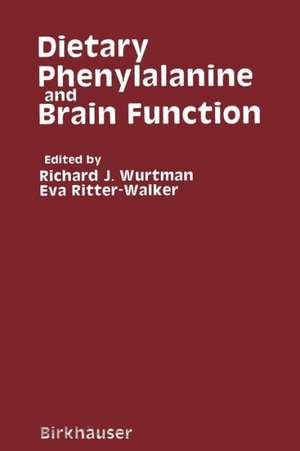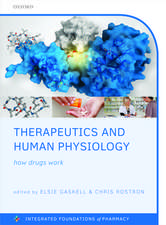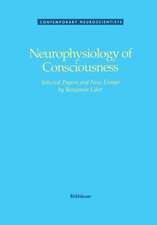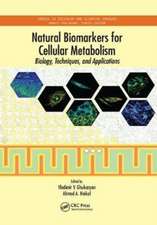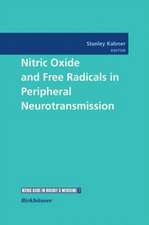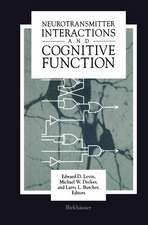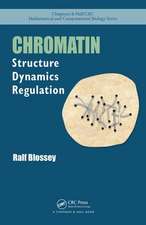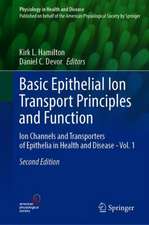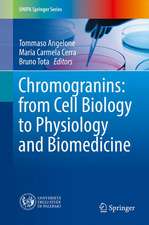Dietary Phenylalanine and Brain Function
Autor WURTMAN, RITTER-WALKERen Limba Engleză Paperback – 22 feb 2012
Preț: 721.77 lei
Preț vechi: 759.76 lei
-5% Nou
Puncte Express: 1083
Preț estimativ în valută:
138.13€ • 143.68$ • 114.03£
138.13€ • 143.68$ • 114.03£
Carte tipărită la comandă
Livrare economică 14-28 aprilie
Preluare comenzi: 021 569.72.76
Specificații
ISBN-13: 9781461598237
ISBN-10: 1461598230
Pagini: 408
Ilustrații: XIV, 391 p.
Dimensiuni: 155 x 235 x 21 mm
Greutate: 0.57 kg
Ediția:Softcover reprint of the original 1st ed. 1988
Editura: Birkhäuser Boston
Colecția Birkhäuser
Locul publicării:Boston, MA, United States
ISBN-10: 1461598230
Pagini: 408
Ilustrații: XIV, 391 p.
Dimensiuni: 155 x 235 x 21 mm
Greutate: 0.57 kg
Ediția:Softcover reprint of the original 1st ed. 1988
Editura: Birkhäuser Boston
Colecția Birkhäuser
Locul publicării:Boston, MA, United States
Public țintă
ResearchCuprins
I. Factors Affecting Blood Phenylalanine Levels.- 1. Control of Plasma Phyenylalanine Levels.- 2. Adrenergic Influence on Plasma and Brain Concentrations of Phenylalanine and Other Large Neutral Amino Acids in Rats.- 3. Effect of Aspartame on Plasma Phenylalanine Concentration in Humans.- 4. Aspartame Consumption in Normal Individuals and Carriers for Phenylketonuria.- II. Blood-Brain Barrier Transport of Phenylalanine.- 5. Phenylalanine Transport at the Human Blood-Brain Barrier.- 6. Regional Transport of Phenylalanine and Other Neutral Amino Acids Across the Blood-Brain Barrier.- 7. Dual Role of Transport Competition in Amino Acid Deprivation of the Central Nervous System by Hyperphenylalaninemia.- III. Effects of Aspartame on Brain Monoamines and Seizure Thresholds in Experimental Animals.- 8. An In Vivo Study of Dopamine Release in Striatum: The Effects of Phenylalanine.- 9. Effects of Aspartame Ingestion on Large Neutral Amino Acids and Monoamine Neurotransmitters in the Central Nervous System.- 10. Aspartame, Phenylalanine, and Seizures in Experimental Animals.- 11. Behavioral and Neurological Effects of Aspartame.- 12. Role of Monoamines in Seizure Predisposition in the Genetically Epilepsy-Prone Rat.- 13. Aspartame Administration Decreases the Entry of ?-Methyldopa into the Brain of Rats.- 14. The Effect of Aspartame on 50% Convulsion Doses of Lidocaine.- 15. Studies on the Susceptibility to Convulsions in Animals Receiving Abuse Doses of Aspartame.- 16. General Discussion: Calculation of the Aspartame Dose for Rodents that Produces Neurochemical Effects Comparable to Those Occurring in People.- IV. Behavioral and Electroencephalographic Effects of Aspartame and Phenylalanine in Humans: Possible Involvement in Seizure Thresholds.- 17. Monoamines and Seizures inHumans.- 18. The Possible Role of Aspartame in Seizure Induction.- 19. Effects of Aspartame on Seizures in Children.- 20. Aspartame and Human Behavior: Cognitive and Behavioral Observations.- 21. Effects of High Plasma Phenylalanine Concentration in Older Early-Treated PKU Patients: Performance, Neurotransmitter Synthesis, and EEG Mean Power Frequency.- 22. Changes in Physiological Concentrations of Blood Phenylalanine Produce Changes in Sensitive Parameters of Human Brain Function.- 23. The Effects of Aspartame on Human Mood, Performance, and Plasma Amino Acid Levels.- 24. Aspartame and Behavior in Children.- 25. Responses to Carbohydrate Consumption Among Insulin-Dependent Diabetics.- V. Behavioral and Neurochemical Effects of Aspartame and Phenylalanine in Patients with Phenylketonuria and Hyperphenylalaninemia.- 26. Epidemiology and Natural History of Phenylketonuria and Other Hyperphenylalaninemias.- 27. Reconsidering the Genetics of Phenylketonuria: Evidence from Molecular Genetics.- 28. Effect of Phenylalanine on Brain Maturation: Implications for the Treatment of Patients with Phenylketonuria.- 29. Patterns of Phenylalanine Metabolites, Vitamin B6 Status, and Learning Disabilities in Phenylketonuria Children: Modeling for Diet Criteria.- 30. The Neurotoxic Metabolite of Phenylalanine in Phenylketonuria.- 31. Increased Vigilance and Dopamine Synthesis Effected by Large Doses of Tyrosine in Phenylketonuria.- 32. Effect of Dietary Tryptophan Supplement on Neurotransmitter Metabolism in Phenylketonuria.- 33. Effect of Aspartame in Diabetic Rats.- 34. Maternal Phenylketonuria Collaborative Study (MPKUCS): USA and Canada.- VI. Aspartame and Food Intake.- 35. Effects of Aspartame on Appetite and Food Intake.- 36. Effects of Phenylalanine and Aspartame on Mealtime FoodIntake and Behavior in Adult Males.- VII. Aspartame and Headache.- 37. Aspartame and Headache.- 38. The Effect of Aspartame Consumption on Migraine Headache: Preliminary Results.- 39. Monitoring of Adverse Reactions to Aspartame Reported to the U.S. Food and Drug Administration.- VIII. Regulatory Status of Phenylalanine as a Nutritional Supplement.- 40. Facts and Myths Related to the Use and Regulation of Phenylalanine and Other Amino Acids.- 41. Perspectives of the Health-Food Industry on the Use of Pure Phenylalanine.- IX. Regulatory Status of Aspartame and Other Artificial Sweeteners.- 42. Regulation of Food Additives with Neurotoxic Potential.- 43. Regulatory Aspects of the Use of Low-Calorie Intensive Sweeteners.- 44. Resources for Inferential Estimates of Aspartame Intake in the United States.- 45. Neurological, Psychiatric, and Behavioral Reactions to Aspartame in 505 Aspartame Reactors.- 46. Public Policy and Food Additives: The NutraSweet Controversy.- 47. The Regulatory Process and Aspartame: Why the Controversy?.- X. Summary.- Conference on Dietary Phenylalanine and Brain Function, May 8–10, 1987, Washington, DC.
